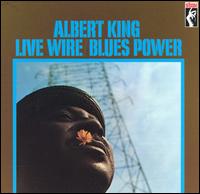| Live Wire / Blues Power | ||||
|---|---|---|---|---|
 | ||||
| Live album by | ||||
| Released | November 1968 | |||
| Recorded | 1968 | |||
| Venue | Fillmore Auditorium, San Francisco | |||
| Genre | Blues | |||
| Length | 38:16 | |||
| Label | Stax [1] | |||
| Producer | Al Jackson Jr. | |||
| Albert King chronology | ||||
| ||||
| Review scores | |
|---|---|
| Source | Rating |
| AllMusic | |
| The Encyclopedia of Popular Music | |
| Mojo | |
| MusicHound Rock: The Essential Album Guide | |
| The Penguin Guide to Blues Recordings | |
| The Rolling Stone Album Guide | |
Live Wire/Blues Power is a blues album by Albert King. [8] It was recorded live in 1968 at the Fillmore Auditorium. [9] Leftovers from the recordings were released on the albums Wednesday Night in San Francisco and Thursday Night in San Francisco . [10]
Contents
The album peaked at No. 150 on the Billboard 200. [11]